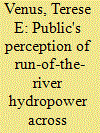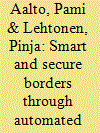| Srl | Item |
| 1 |
ID:
176758


|
|
|
|
|
| Summary/Abstract |
A large share of future European hydropower projects will be run-of-the-river schemes. To understand the potential for RoR hydropower development and modernization of the technology as an opportunity for sustainable decentralization, we use the Q-methodology to compare public values about RoR hydropower in German, Portuguese and Swedish case studies. Four perspectives on the importance of RoR hydropower emerged from our analysis: (i) maintain regional control, (ii) fight climate change, (iii) promote citizen well-being and (iv) protect natural ecosystems. Strong preferences for regional control imply RoR should be managed as distributed generation rather than viewed as part of a centralized, national system like traditional large-scale reservoir hydropower. Based on the importance of citizen well-being and ecological measures, operators could adopt strategies such as river widening and the reconstruction of secondary channels, which help control floods, create recreational opportunities as well as enhance ecological habilitation and biodiversity. Additionally, policymakers could support rigorous monitoring programs to assess the ecological impact of RoR.
|
|
|
|
|
|
|
|
|
|
|
|
|
|
|
|
| 2 |
ID:
153341


|
|
|
|
|
| Summary/Abstract |
The European Commission launched the “Smart Borders” policy process in 2011 to enhance border security in the European Union (EU) using technologisation and harmonisation. This includes the use of automated border control (ABC) systems. The Member States crucially shape the process, weighing security technologies and costs, privacy and rights, and further institutional choices. We examine the views of political stakeholders in four Member States by conducting a systematic empirical and comparative study unprecedented in the existing, political-theory-inspired research. In our Q methodological experiments, political stakeholders in Finland, Romania, Spain and the UK rank-ordered a sample of statements on Smart Borders, ABC and harmonisation. The factor analysis of the results yielded three main views: the first criticising ABC as a security technology, the second welcoming the security gains of automation and the third opposing harmonised border control. While impeding harmonisation, the results offer a consensus facilitating common policy.
|
|
|
|
|
|
|
|
|
|
|
|
|
|
|
|